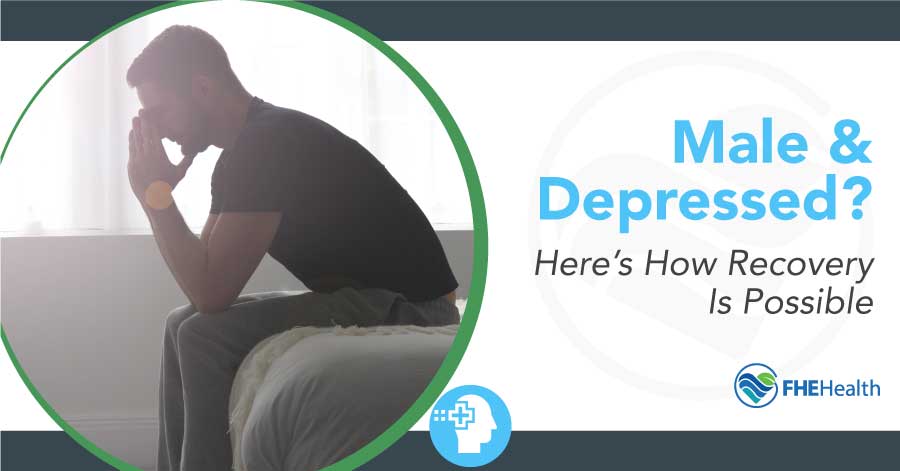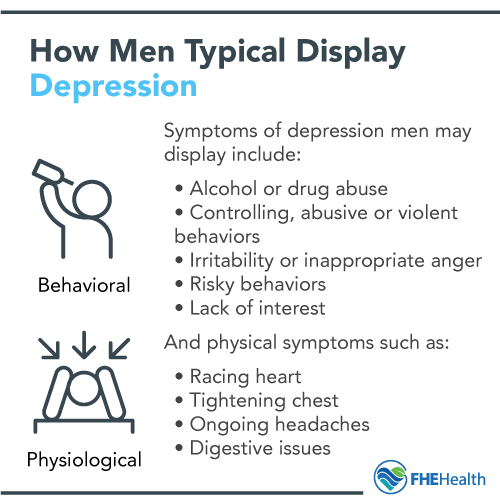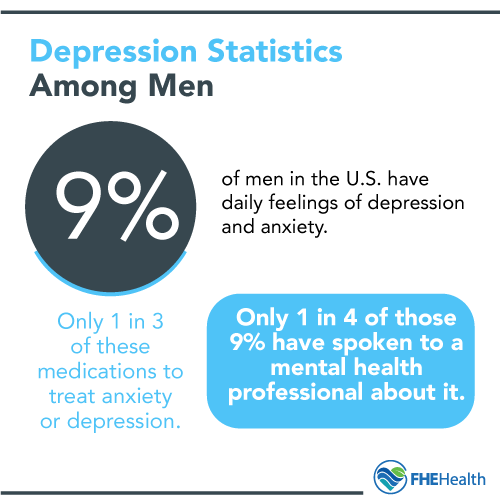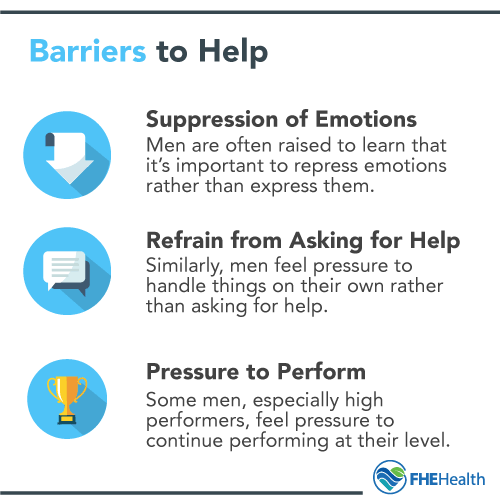
According to the Anxiety and Depression Association of America, anxiety and depression are the most common mental illnesses in America today. In fact, more than 40 million adults age 18 and older suffer from some type of depression or mental illness. While women are more likely to suffer from depression than men, statistics show that 9% of the male population has daily feelings of depression and anxiety. Factors that contribute to this include the systemic expectations of roles in work and family. These traditional roles may imply that they should be the sole breadwinner for the family and downplay the importance of a support system from family, friends and coworkers.
Knowing how men and women respond and react to anxiety is only the beginning of how to get back to a normal life after depression.
The Experience of Depression for Men
 Depression affects men and women differently. Societal expectations may permit women to cry, turn to friends, show a decreased interest in activities that once gave them joy, experience feelings of being out of control or may even sleep too much. In general, women are expected to express their emotion more than men.
Depression affects men and women differently. Societal expectations may permit women to cry, turn to friends, show a decreased interest in activities that once gave them joy, experience feelings of being out of control or may even sleep too much. In general, women are expected to express their emotion more than men.
While men may experience the same feelings of hopelessness, their expected expression of these feelings and their outward signs are often quite different. Men may display an escapist behavior, like playing too many video games or spending a lot of time at work. Men typically hold their feelings in and can often be quite good at acting like nothing is wrong. Symptoms of depression men may display include:
- Alcohol or drug abuse
- Controlling, abusive or violent behaviors
- Irritability or inappropriate anger
- Risky behaviors
- Lack of interest
And physical symptoms such as:
- Racing heart
- Tightening chest
- Ongoing headaches
- Digestive issues
Loss of Hope for the Future
Ongoing mental health issues and mood disorders can lead to feelings of hopelessness for the future. This often happens when men experience defeat in their daily lives or when they are in a damaging situation they can’t change, like a failed marriage or a job they don’t like.
According to the Mayo Clinic, male depression can be very serious because men tend to ignore the symptoms or refuse treatment for the disorder. Because of this, just trying to get through each day can seem overwhelming. When pushed to the limit, women experiencing these types of feelings often attempt suicide. In the same situation, men are more likely for their suicide attempts to be fatal due to the methods used, such as guns and other weapons. Men may also act more impulsively on their suicidal thoughts than women, and they typically display fewer warning signs, which makes it less likely for someone to step in and intervene.
Depression Statistics Among Men

The National Health and Nutrition Examination Survey showed that 8.1% of all adults age 20 and older suffered from some sort of depression during an initial two-week period. The same study showed that as the family income increased, the prevalence of depression decreased, and nearly 80% of those with depression reported problems with the home, work, and their social lives.
The American Psychological Association offers additional statistics about men and depression, including:
- While 9% of the men in the United States have daily feelings of depression and anxiety…
- Only one in three of these men take medications to treat anxiety or depression.
- One in four of these men has spoken to a mental health professional about anxiety or depression.
- Approximately one in three men have suffered from some type of anxiety or depression during their lifetime.
- The suicide rate for depression in men is four times higher than in women.
- White men age 85 and older have the highest suicide rate of any demographic in the United States.
How Men Experience Depression
While depression and anxiety symptoms differ from one person to the next, men are more likely to feel tired and irritable and have trouble sleeping. Other symptoms men are likely to exhibit with depression include:
- Feeling sad
- Feelings of hopelessness
- Extreme fatigue
- Trouble concentrating
- Changes in eating habits
- Suicide attempts or thoughts of suicide
- Complaints of aches and pains
- Inability to meet daily responsibilities
Barriers to Help

Many boys are also raised to not show emotion, especially in the form of crying or expressing vulnerability. They are told “boys don’t cry” or “boys should be tough.” Many men go through their entire lives suppressing their feelings until they are unable to identify with them or acknowledge them. They may also worry that if they show they are depressed and sad, they will embarrass family or let down their loved ones. Because they are out of touch with their own feelings, they may not even realize they are depressed.
To benefit from therapy, a man must first admit he needs help.
How to Live a Normal Life With Depression
For most individuals with depression, treatment options are available to help you cope with your symptoms and to improve your quality of life. If you want to know how to get back to normal life after depression, consider some of the following methods for addressing your mental health.
Building a Support Network. This is accomplished by creating a group of friends and family who care. Supportive loved ones can go a long way to improving depression. There are also community groups you can join for people who understand your struggle.
Get Enough Sleep. Improving your sleep habits also helps individuals with depression improve their quality of life. According to Psychology Today, individuals who addressed their sleep issues often doubled their success rate for depression treatment.
Reduce Stress. Simple practices like following breathing exercises and relaxation techniques and getting regular exercise to help reduce the stress hormone cortisol will reduce depression and anxiety. But also don’t be afraid to make a life-change if it will decrease your stress.
Improve Your Eating Habits. According to Medical News Today, a healthy diet can significantly reduce symptoms of depression. Choose meals high in vegetables and fiber for the best results.
Get Help. If you or a loved one is suffering from depression and you need help. FHE Health can provide the assistance you need. Contact one of our counselors 24/7 at (833) 596-3502 for more information on our available programs.






